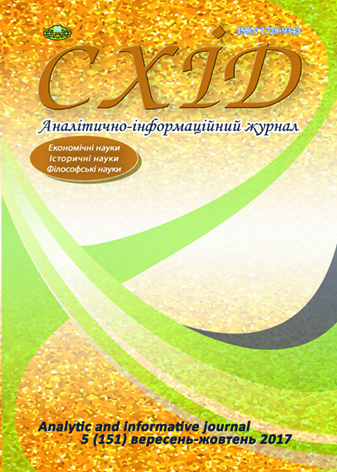Value basis of the Polish modernization: M. Dzelski
DOI:
https://doi.org/10.21847/1728-9343.2017.5(151).117431Keywords:
civil society, Polish intellectuals, colonial discourse, cliental subjugation, Central European discourse, the identity of Central Europe, modernization and rationalization, universal society, ethos, moral valuesAbstract
This paper considers normative dimensions of modernization in Central Europe and role of M. Dzelski in the moral sanitation of post-soviet societies. He uses moral-normative approach as a starting point of his research of Soviet epoch, national memory and formation civil society in Poland. M. Dzelski argues that re-claiming of the past, the revival of values and traditional culture is central to transition in overcoming their occupation legacy. For him intellectuals are a central component and driving force of values transformation. M. Dzelski states that moral values for Central European intellectuals historically were not a private matter but were conceived as a collective guarantee of justice and common good. For this group, pre-modern moral values are a source of civil participation and the embodiment of the practice alternative to colonial power. At the same time he focused on the combination Christian principles in culture and liberal motivation in economical life.
The author emphasizes social and cultural determinants of the process of formation and development of traditional and post-material values, their conceptualization in Central Europe. The analysis is centered on the clash of democratic and cliental discourses in the context of shaping the identity in the in the third Rzeczpospolita. The paper raises some general problems regarding these discourses as well as the development of values within the life world of local intellectual community in the context of its belonging to certain socio-cultural traditions, its compatibility with the dimensions of morality, social responsibility and openness to changes. Synthesizing the different approaches to the historical experience of formation and evolution of the intellectual community, it also explores the role and significance of M. Dzelski's philosophy in the process of social changes.References
Kolakowski, L. (1993), The Myth of the Self-identification Man, Civil Society and the State.London UK.Press, 424-425 (eng).
Dzielski, M. (1995), Rebirth of the spirit - the construction of freedom Writings, Krakow Industrial Society, Znak, 984 p. (pol).
Dzielski, M. (1983), Liberalism and Christianity. Krakow Industrial Society, available at: http://www.omp.org.pl/artykul.php?artykul=106
Kuninski, Milowit (1999), The ethical and religious basis of liberalism by Miroslaw Dzielski. Available at: http://www.omp.org.pl/stareomp/indexbd79.html?module=subjects&func=viewpage&pageid=53
Dzielski, M. (1983), The need for creative anti-communism Krakow Industrial Society, Znak, p. 12 (pol).
Dzielski, M. (1995), The spirit of the coming time, in: Rebirth of the spirit - the construction of freedom Writings, Krakow Industrial Society, Znak, 249-269. (pol).
Dzielski, M. (1995), Polish policy today, in: Rebirth of the spirit - the construction of freedom Writings, Krakow Industrial Society, Znak, 919-943. (pol).
Dzielski, M. (1995), Building a historic compromise, in: Rebirth of the spirit - the construction of freedom Writings, Krakow Industrial Society, Znak, 297-293. (pol).
Downloads
Published
How to Cite
Issue
Section
License
Copyright (c) 2017 Yaroslav Pasko

This work is licensed under a Creative Commons Attribution-NonCommercial-NoDerivatives 4.0 International License.
1. Authors bear responsibility for the accuracy of facts, quotations, numbers and names used.
2. Manuscripts are not sent back.
3. The publisher does not always agree with the authors' opinion.
4. The authors reserve the right to authorship of the work and pass the first publication right of this work to the journal under the terms of a Creative Commons Attribution Non-Commercial License, which allows others to freely distribute the published research with the obligatory reference to the authors of the original work and the first publication of the work in this journal.
5. The authors have the right to conclude separate supplement agreements that relate to non-exclusive work distribution in the form in which it has been published by the journal (for example, to upload the work to the online storage of the journal or publish it as part of a monograph), provided that the reference to the first publication of the work in this journal is included.

